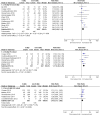Effects of the frailty phenotype on post-operative complications in older surgical patients: a systematic review and meta-analysis
- PMID: 31126245
- PMCID: PMC6534823
- DOI: 10.1186/s12877-019-1153-8
Effects of the frailty phenotype on post-operative complications in older surgical patients: a systematic review and meta-analysis
Abstract
Background: Frailty has been generally been associated with adverse events in older patients under surgery. Frailty phenotype is the most widely used instrument in the research literature. However the effect of the frailty phenotype on post-operative events was still unclear. The purpose of this systematic review was to explore the association between frailty phenotype and post-operative complications among surgical patients aged 60 years and over.
Methods: Relevant studies were identified by systematically searching of PubMed, Embase, the Cochrane Library and the Web of Science databases from their beginning to March 2017. Both random-effects models and fixed-effects models were used to combine the risk ratios (RRs) and 95% confidence intervals (CIs). A subgroup analysis was performed to identify the sources of heterogeneity and a sensitivity analysis to identify the strength of the results.
Results: Twelve prospective cohort studies involving a total of 2278 patients were included. The risk of post-operative complications in the frail group was higher than the non-frail group (RR: 1.6; 95% CI: 1.60-2.13). Compared with the robust group, geriatric patients with frailty or pre-frailty had a higher risk of post-operative complications. The RRs were 1.77 (95% CI: 1.40-2.25) and 1.45 (95% CI: 1.17-1.80), respectively.
Conclusion: Frailty phenotype should be considered as a useful risk assessment tool for preoperative evaluations of geriatric patients by medical staff.
Keywords: Frailty phenotype; Geriatric patients; Postoperative complications; Surgery.
Conflict of interest statement
The authors declare that they have no competing interests.
Figures
Similar articles
-
Frailty and postoperative complications in older Chinese adults undergoing major thoracic and abdominal surgery.Clin Interv Aging. 2019 May 22;14:947-957. doi: 10.2147/CIA.S201062. eCollection 2019. Clin Interv Aging. 2019. PMID: 31190780 Free PMC article.
-
The impact of frailty on posttraumatic outcomes in older trauma patients: A systematic review and meta-analysis.J Trauma Acute Care Surg. 2020 Apr;88(4):546-554. doi: 10.1097/TA.0000000000002583. J Trauma Acute Care Surg. 2020. PMID: 32205823
-
Accuracy and Feasibility of Clinically Applied Frailty Instruments before Surgery: A Systematic Review and Meta-analysis.Anesthesiology. 2020 Jul;133(1):78-95. doi: 10.1097/ALN.0000000000003257. Anesthesiology. 2020. PMID: 32243326
-
The Impact of Frailty on 30-day Post-Elective Surgery Complications in Elderly Patients: a Prospective Cohort Study.Acta Med Indones. 2020 Oct;52(4):344-351. Acta Med Indones. 2020. PMID: 33377879
-
Prospective Comparison of Preoperative Predictive Performance Between 3 Leading Frailty Instruments.Anesth Analg. 2020 Jul;131(1):263-272. doi: 10.1213/ANE.0000000000004475. Anesth Analg. 2020. PMID: 31569165
Cited by
-
Mitigating the stress response to improve outcomes for older patients undergoing emergency surgery with the addition of beta-adrenergic blockade.Eur J Trauma Emerg Surg. 2022 Apr;48(2):799-810. doi: 10.1007/s00068-021-01647-7. Epub 2021 Apr 13. Eur J Trauma Emerg Surg. 2022. PMID: 33847766 Free PMC article. Review.
-
Association of Preoperative High-Intensity Interval Training With Cardiorespiratory Fitness and Postoperative Outcomes Among Adults Undergoing Major Surgery: A Systematic Review and Meta-Analysis.JAMA Netw Open. 2023 Jun 1;6(6):e2320527. doi: 10.1001/jamanetworkopen.2023.20527. JAMA Netw Open. 2023. PMID: 37389875 Free PMC article.
-
Frailty and risk of complications in head and neck oncologic surgery. Systematic review and dose-response meta-analysis.Med Oral Patol Oral Cir Bucal. 2021 Sep 1;26(5):e582-e589. doi: 10.4317/medoral.24588. Med Oral Patol Oral Cir Bucal. 2021. PMID: 34414998 Free PMC article.
-
Pancreaticoduodenectomy in patients < 75 years versus ≥ 75 years old: a comparative study.Aging Clin Exp Res. 2024 Jul 4;36(1):141. doi: 10.1007/s40520-024-02804-9. Aging Clin Exp Res. 2024. PMID: 38965089 Free PMC article.
-
Handgrip strength predicts length of hospital stay in an abdominal surgical setting: the role of frailty beyond age.Aging Clin Exp Res. 2022 Apr;34(4):811-817. doi: 10.1007/s40520-022-02121-z. Epub 2022 Apr 7. Aging Clin Exp Res. 2022. PMID: 35389186 Free PMC article.
References
-
- Hall MJ, DeFrances CJ, Williams SN, Golosinskiy A, Schwartzman A. National Hospital Discharge Survey: 2007 summary. Natl Health Stat Report. 2010;29:1–20, 24. - PubMed
-
- Centre HSCI. Hospital episode statistics, admitted patient care - England, 2014–15: procedures and interventions. 2015. https://digital.nhs.uk/data-and-information/publications/statistical/hos....
-
- Sundermann S, Dademasch A, Rastan A, Praetorius J, Rodriguez H, Walther T, et al. One-year follow-up of patients undergoing elective cardiac surgery assessed with the comprehensive assessment of frailty test and its simplified form. Interact Cardiovasc Thorac Surg. 2011;13(2):119–23, 123. doi: 10.1510/icvts.2010.251884. - DOI - PubMed
Publication types
MeSH terms
LinkOut - more resources
Full Text Sources
Medical




